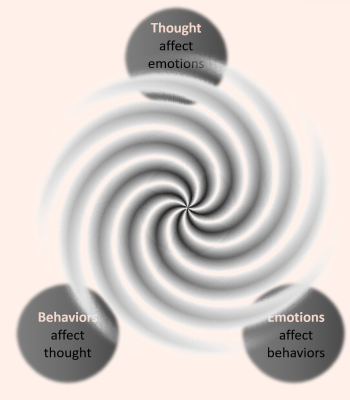
Are You Looking for Happiness or Life Satisfaction?
It’s pretty hard to tell what does bring happiness. Poverty and wealth have both failed.

Imagine you just received good news and feeling ecstatic you go for a walk. Two steps away, you see a dear friend but you are not able to reach her. She doesn’t say hello, either. You think: “Jane was lost in her thoughts. Let me call her.” Imagine now your job application just got rejected and you run out of coffee for breakfast. On the way to the supermarket, you see Jane but she doesn’t say hello. You start thinking “Jane pretended not to see me. She must be upset with me. I will ignore her”.
Two emotional states, two thinking patterns, two different reactions to the same situation. It doesn’t stop here. The way we react reinforces our emotions: ignoring a friend will only enhance our bad mood.
It’s quite common to react with more hostile thoughts when we bear negative feelings. We are not entirely rational creatures. We got emotions that often get in the way. We call it “a bad day”. The issue is when many bad days in a row get us stuck and sad.
Let’s first have a closer look at our beast. What exactly is distorted thinking?
Cognitive distortions were originally defined by Aaron Beck (1963) as the result of processing information from reality in ways that lead to predictable thinking errors. At the time, Beck identified a number of errors that people with depression commonly do. For example, overgeneralization is applying the result of one situation to all situations. You once had a bad experience speaking in public and you think of yourself as someone who will never be able to speak up in public. Personalization is another cognitive distortion: in ambiguous situations, you incorrectly assume that you’ve been intentionally excluded. Personalization is the cognitive distortion used in the example at the beginning of the article.
Making these thinking errors does not imply we have depression. When stressful events deplete our resources, we might start feeling overwhelmed by negative emotions, which can affect our ability to think rationally. The problem starts when cognitive distortions develop further into habitual ways of thinking and become rules that reinforce our negative emotions. Not just our beliefs are affected but also the way we respond to events (calling a friend or ignoring her).
We must be aware that among emotions, thoughts, and behaviors is a spiral that can go upward or downward. It’s a spiral that can get us in a better or in a worse place.

I find the logic behind cognitive distortions extremely intriguing: apparently, innocent thinking errors can affect important decisions in our daily life and start a risky downward spiral. In addition, having a brilliant mind capable of exceptional ideas won’t do any good: if you adopted a faulty mindset, this might create obstacles to your own talent.
Is there a way to stop the downward spiral?
The good news is: there is!
Beck’s model lined the foundation for what is currently known as Cognitive-Behavioral Therapy (CBT). CBT is a common type of talk therapy that helps people identifying faulty thoughts and evaluate how realistic these thoughts are, in order to change them (Becks, 2011).
Evidence accumulated over the years has shown that CBT is the most effective treatment for numerous mental health conditions, from depression to eating disorders, to post-traumatic stress disorder (Atwood 2020; Coull, 2011; Simon 2019;).
CBT benefits also people without a diagnosed mental health condition. It can be an effective tool for anyone facing stressful life events triggering distorted thinking patterns (Bamber, 2006).
I am not suggesting everyone having a bad day should book an appointment for CBT. But if you noticed you are abusing the expression “it’s just a bad day”, then it might be something to consider.
If you just want to become more aware of your thinking errors, start to see events as neutral. Put yourself in control and acknowledge that bad emotions are not triggered by the event itself, but by the way you think about the event.
For example, if someone insults you and says that you are selfish, there is no actual loss or damage. The event per se is neutral. You decide to what extent this event will affect the way you think about yourself. You can neutrally consider the content of the insult. You can turn it into a growth opportunity. You can overgeneralize and think you are a complete jerk.
All our experiences pass through the filter of our brain to be interpreted and to be labeled with an emotion. Pause and ask yourself: do I really want to start this downward spiral?
References
Atwood, M. E., & Friedman, A. (2020). A systematic review of enhanced cognitive behavioral therapy (CBT‐E) for eating disorders. International Journal of Eating Disorders, 53(3), 311–330.
Bamber, M. R. (2006). CBT for occupational stress in health professionals: Introducing a schema-focused approach. Routledge/Taylor & Francis Group.
Beck, A. T. (1963). Thinking and depression: I. Idiosyncratic content and cognitive distortions. Archives of general psychiatry, 9(4), 324–333.
Beck, J. S. (2011). Cognitive Behavior Therapy: Basics and Beyond, 2nd Edn New York. NY: Guilford Press.[Google Scholar].
Coull, G., & Morris, P. G. (2011). The clinical effectiveness of CBT-based guided self-help interventions for anxiety and depressive disorders: a systematic review. Psychological medicine, 41(11), 2239–2252.
Simon, N., McGillivray, L., Roberts, N. P., Barawi, K., Lewis, C. E., & Bisson, J. I. (2019). Acceptability of internet-based cognitive behavioural therapy (i-CBT) for post-traumatic stress disorder (PTSD): a systematic review. European journal of psychotraumatology, 10(1), 1646092.

It’s pretty hard to tell what does bring happiness. Poverty and wealth have both failed.

It’s hard to experience intimacy when these needs compete with love
© 2025 Rewired Life & Executive Coaching All Rights Reserved.
One Response
I was pretty pleased to discover this web site. I want to to thank you for your time for this fantastic read!! I definitely really liked every bit of it and I have you book marked to see new things on your web site.